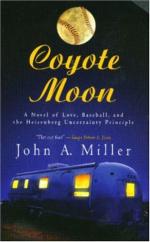|
This section contains 609 words (approx. 3 pages at 300 words per page) |

|
Classical physicists were convinced that the only limitations on the knowledge would derive from limitations inherent in our ability to make measurements of the phenomena in question. However, in 1927, Werner Heisenberg, while studying the motion of the electron, discovered that a fundamental uncertainty exists in any attempt to accurately measure both the momentum and position of an electron. Heisenberg's discovery became the basis for his quantum mechanical uncertainty principle. The simplest statement of this principle is that it is not possible to determine at the same time the position and momentum of a particle. The more precise the measurement of position, the less precise the knowledge of the particle's momentum. (Mathematically, the principle states the product in the uncertainty in position and uncertainty in momentum cannot be less than Planck's constant divided by 2 .) Trying to simultaneously determine both a particle's position and momentum becomes...
|
This section contains 609 words (approx. 3 pages at 300 words per page) |

|


